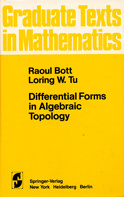[They] came up with a two-way tie between Maxwell’s equations
and Euler’s equation
The remarkable appeal of Euler’s equation is that it contains in such a compact form the five most important numbers, 0,1,i,π,e, and the three basic operations, +,×, ˆ. But my own choice would have been Maldacena’s equation
AdS = CFT
because this contains all the central concepts of fundamental physics: Maxwell’s equations, to start with, and their non-Abelian extension, plus the Dirac and Klein-Gordon equations, quantum mechanics, quantum field theory and general relativity.All good equations and I must say I stand in awe of how much symmetry, beauty, and information they pack into one line.
That said, my favorite equation is Stokes Theorem written in the full differential forms machinery:
Look how symmetric! This equation both generalizes the fundamental theorem of calculus and illuminates the heart of the duality between homology and cohomology groups in algebraic topology.
Now, please share your own equations and why you like them! I'm interested in what your favorite equations are, whether you enjoy them for technical reasons or not. Even if your equation is something like:
One egg + one cup of sugar + one cup of peanut butter + 10 minutes at 350 degrees = a surprisingly good set of peanut butter cookies.Please share.




I guess my chemical equation! would be:
ReplyDeleteC6H12O6 → 2 CH3CH2OH + 2 CO2.
I am not yet sure about the physical equation.
I think my favorite (in LaTeX form) is either
ReplyDeleteG_{\mu \nu} + \Lambda g_{\mu \nu} = 8 \pi T_{\mu \nu}
because it's really trippy to think that space is defined by what's in it or
\vec{F} = \frac{d \vec{p}}{d t}
because it's really what started it all and it's still got it after over 300 years.
My favorite is S = E X B
ReplyDeleteI think my two favorite equations are:
ReplyDeleteE = E and p = p
That is, conservation of energy and conservation of momentum (I could write them a little better, E_i = E_f and p_i = p_f). Like Maxwell's equations which are popular because they show interesting physics, the conservation equations are also extremely important for solving important problems (like the break down of glucose that linus gave, which is just a conservation of mass (energy) equation). But also like Euler's equation it is also interesting because it is an identity, and has interesting consequences outside of just physics and math (for example Aristotle's Law of Identity).
Jean le Rond d'Alembert, a French mathematician, introduced the principle in 1742:
ReplyDeleteFor a body in equilibrium, Sum of all forces acting on it zero.
And, it was some stupid quantum fluctuation that started the whole mess, bringing forth the Universe in motion,
I've got a couple. The first would be Euler's equation. ($\exp(ix) + 1 = 0$ -- It's just beautiful!)
ReplyDeleteThe second is (again in LaTeX):
$$\int_{x=-\infty}^\infty \dfrac{1}{\Gamma(\alpha+x) \Gamma(\beta-x)} \,dx = \dfrac{2^{\alpha + \beta - 2}}{\Gamma(\alpha + \beta - 1)}, \text{ For } \Re[\alpha+\beta] > 1$$
Why I like this one is a long story, but I really do think it's cool.
What an interesting question. I've actually never thought much about it. If you know anything about Signal Processing or Control theory it should come as no surprise that I love the equation Ax=b. In engineering, this is almost always what it boils down to - solving this equation. Sure you could take the inverse, but you'd better not! So much of our world, at least for engineers, boils down to a representation like this. And the theory of abstract linear algebra is so powerful for solving complex problems in many many dimensions. I really enjoy it.
ReplyDeleteAlways liked 1+1=2.
ReplyDeletepythagorean theorem all the way.
ReplyDeletea^2+b^2=c^2.
some guy,
ReplyDeleteYes, the pythagorean theorem is awsome.
2 ^ aleph-null = C
ReplyDelete